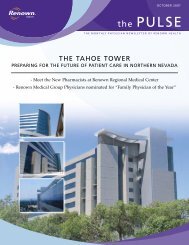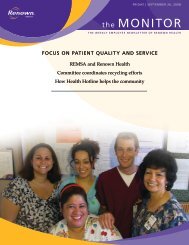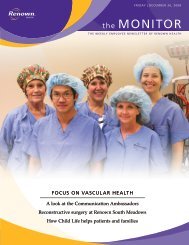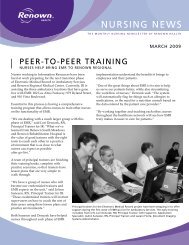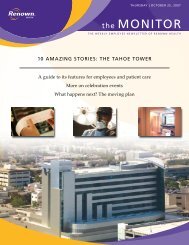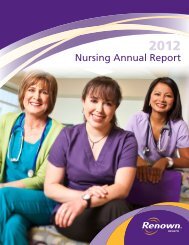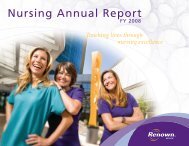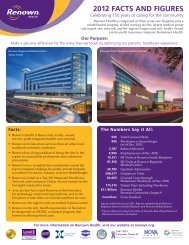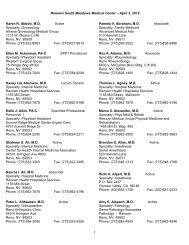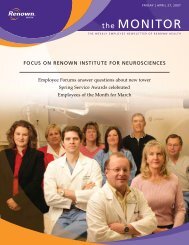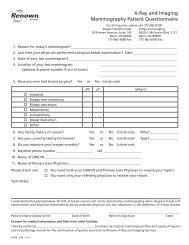Conquering Colon Cancer - Renown Health
Conquering Colon Cancer - Renown Health
Conquering Colon Cancer - Renown Health
Create successful ePaper yourself
Turn your PDF publications into a flip-book with our unique Google optimized e-Paper software.
<strong>Renown</strong> institute foR canceR<br />
28<br />
WeLLNess & PreveNtioN GuiDe*<br />
your guide<br />
to screenings<br />
General screenings<br />
during your physical exam, your physician may include examinations for cancers of the thyroid, oral cavity, lymph nodes,<br />
and other types of cancer depending on your age, sex, family history and other risk factors.<br />
General screenings age 18-39 age 40-49 age 50-64 age 65+ comments<br />
Physical exam annually annually annually annually additional exams may be<br />
necessary as your health<br />
demands.<br />
skin exam every other<br />
year<br />
breast cancer screening<br />
<strong>Renown</strong> joURneY<br />
annually annually annually More frequent exams may be<br />
necessary depending on family<br />
history and risk factors.<br />
women at increased risk of breast cancer should talk to their doctor about the benefits and limitations of adding mRI<br />
screening to their yearly mammogram screening.<br />
screening age 18-39 age 40-49 age 50-64 age 65+ comments<br />
breast self-exam Learn by age<br />
20. Monthly.<br />
Monthly Monthly Monthly women should know<br />
how their breasts<br />
normally feel and<br />
report any breast<br />
change promptly to<br />
their health providers.<br />
breast exam by<br />
Physician<br />
every 3 years annually annually annually<br />
mammogram usually not<br />
needed<br />
annually annually annually<br />
cervical cancer screening<br />
If you are over age 30 and have had three or more normal pap tests in a row, talk to your doctor about a revised test<br />
schedule. women with certain risk factors may need to be screened more often; please speak with your physician.<br />
screening age 18-39 age 40-49 age 50-64 age 65+ comments<br />
Pap/Pelvic exam annually,<br />
beginning 3 years<br />
after a woman<br />
begins having<br />
vaginal intercourse<br />
or by age 21.<br />
annually annually annually women 70 years of age or<br />
older who have had 3 or<br />
more normal Pap tests in a<br />
row and no abnormal Pap<br />
tests in the last 10 years<br />
may choose to stop having<br />
cervical cancer screening.<br />
* American <strong>Cancer</strong> Society Guidelines for the Early Detection of <strong>Cancer</strong>; http:// www.cancer.org.<br />
colorectal cancer screening**<br />
Beginning at age 50 (45 for african americans), both men and women at average risk for developing colorectal cancer should<br />
use one of the screening tests below. If you are at moderate or high risk for colon cancer, talk to your physician about a<br />
different test schedule.<br />
screening age 18-49 age 50-75 age 76-85 age 86+<br />
High-sensitivity Fecal occult<br />
blood test (Fobt)<br />
usually not<br />
needed<br />
sigmoidoscopy usually not<br />
needed<br />
colonoscopy usually not<br />
needed<br />
Lung cancer screening<br />
annually Routine screenings<br />
not needed – consult<br />
your physician<br />
every 5 years,<br />
with highsensitivity<br />
foBt<br />
every 3 years<br />
Routine screenings<br />
not needed – consult<br />
your physician<br />
every 10 years Routine screenings<br />
not needed – consult<br />
your physician<br />
Do not screen<br />
Do not screen<br />
Do not screen<br />
the american College of Chest physicians recommends that individuals should only be screened with low-dose Ct in the<br />
context of well-designed clinical trials. screening should only be performed when the clinician and patient are committed to<br />
pursuing follow-up investigations, including serial imaging and possible surgical lung biopsy.<br />
screening age 18-39 age 40-49 age 50-64 age 65+ comments<br />
Low-dose<br />
Lung ct<br />
usually not<br />
needed<br />
men’s cancer screening<br />
consider if at<br />
risk<br />
consider if at<br />
risk<br />
consider if at<br />
risk<br />
Lung cancer ct screening may<br />
be considered for those with a<br />
history of smoking.<br />
Both the prostate-specific antigen (psa) blood test and digital rectal examination (dRe) should be offered annually, beginning<br />
at age 50. Information should be provided to all men about what is known and what is uncertain about the benefits,<br />
limitations, and harms of early detection and treatment of prostate cancer so that they can make an informed decision about<br />
testing.<br />
screening age 18-39 age 40-49 age 50-64 age 65+ comments<br />
Digital rectal<br />
exam<br />
usually not<br />
needed<br />
Prostate Psa usually not<br />
needed<br />
testicular<br />
self-exam<br />
Learn by age<br />
20. Monthly.<br />
usually not<br />
needed<br />
usually not<br />
needed<br />
annually annually Digital Rectal exam should<br />
begin at age 45 for african<br />
american males and those with<br />
a family history.<br />
annually annually Psa should begin at age 45 for<br />
african american males and<br />
those with a family history.<br />
Monthly Monthly Monthly Be sure to follow up with<br />
your physician if you have any<br />
concerns.<br />
**Colorectal <strong>Cancer</strong> Screening guidelines provided by the U.S. Preventive Services Task Force.<br />
renown.org 29



